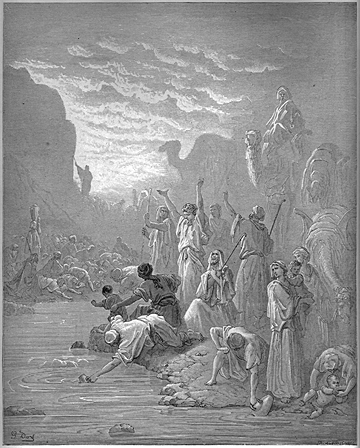Exodus 17
1 Obeying what Yahweh commanded, all the Israeli people moved from the Sin Desert. They/We traveled from one place to another. They/We camped at [a place named] Rephidim, but there was no water there for (the people/us) to drink.
Nienga i fatrambey Siney mb’ ami’ty lia’ iareo ty valobohò’ o ana’ Israeleo ty ami’ty falie’ Iehovà vaho nañialo e Refidìme fe tsy aman-drano ho kamae’ ondatio.
2 So the people complained to Moses/me again, saying, “Give us water to drink!” Moses/I replied to them, “Why are you (criticizing/arguing with) me [RHQ]? And why are you trying to determine whether Yahweh [has the power to provide for you]?”
Le nidoha raha amy Mosè ondatio nanao ty hoe, Meo rano hinome’ay. Hoe t’i Mosè am’ iereo, Ino ty idabasidà’ areo amako? Ino ty itsoha’ areo t’Iehovà?
3 But the people were very thirsty, and they continued to complain to Moses/me. They were saying things like “Why did you bring us out of Egypt?”, and “Did you bring us here to cause us and our children and livestock to die (from thirst/because we had no water to drink) [RHQ]?”
Fe nifeake hataliñiereñe ondatio vaho nitoreo amy Mosè ami’ty hoe, Ino ty nampiavota’o anay amy Mitsraime hamonoa’o anay naho o keleia’aio naho o hare’aio an-karan-dranoañe?
4 So Moses/I prayed earnestly to Yahweh. He/I said, “(How shall I deal with these people?/I do not know how to deal with these people!) [RHQ] They are almost ready to [kill me by throwing] stones at me!”
Aa le nitoreo am’ Iehovà t’i Mosè, ami’ty hoe: Ino ty hanoeko am’ondaty retoañe? Didý tsy ametsaha’ iareo vato.
5 Yahweh replied to Moses/me, “Take some of the elders/leaders of the Israeli people with you and [tell the rest of] the people to follow you [to Sinai Mountain]. Take along the stick with which you struck the Nile [River].
Hoe t’Iehovà amy Mosè, Miaria aolo’ ondatio, le ampindrezo o androanavi’ Israeleo; tintino am-pitañe i kobay napao’o i Naileiy, le akia.
6 Listen carefully: I will stand in front of you on top of a [large] rock at the foot of the mountain. Strike the rock with your stick. [When you do that], water for the people to drink will flow out of the rock.” [When they/we arrived at the mountain], Moses/I did that while the Israeli elders were watching, [and water flowed from the rock].
Inao, hijohañe añatrefa’o ambone’ i vato’ i Korèbey iraho. Paoho i vatoy, le hiakaran-drano, hikamà’ ondatio. Nanoe’ i Mosè izay, ampahaisaha’ o androanavi’ Israeleo.
7 Moses/I gave that place two names [in the Hebrew language: ] Massah, [which means ‘testing’], and Meribah, [which means ‘complaining’]. He/I gave it the name Massah because the Israeli people were testing Yahweh, saying “Is Yahweh really among us [and able to help us], or not?”, and he/I gave it the name Meribah because they were [continually] complaining.
Natao’e Masà naho Meribà i toetsey amy te nidoha raha naho nitsoke Iehovà o ana’Israeleo ami’ ty hoe, Amantika hao t’Iehovà ke ts’ie?
8 Then the descendants of the Amalek people-group came and fought against the Israeli people at Rephidim.
Niheo mb’eo amy zao t’i Amalèke nifañotak’ am’Israele e Refidime eo.
9 Moses/I said to Joshua, [who was one of our army/Israeli leaders], “Choose some men to go out and fight against the Amalek people-group tomorrow. I will stand on the top of the hill, holding the stick that God told me to carry.”
Hoe t’i Mosè am’ Iehosoa, Joboño ondaty ho antika, le mionjona hialy amy Amalèke. Hijohañe ambone’ o vohitseo iraho te hamaray le ho an-tañako i kobain’ Añaharey.
10 So Joshua did what Moses/I told him to do. He took some men to fight against the Amalek people-group. [While they were fighting], Aaron, Hur, and Moses/I went up to the top of the hill [so that they/we could see the whole battle area].
Le nanoe’ Iehosoa i nampanoe’ i Mosèy vaho nialy amy Amalèke, le nañambone’ i vohitsey t’i Mosè naho i Aharone vaho i Khòre.
11 Whenever Moses/I lifted up his/my arms, the Israeli men started to win [the battle]. And whenever he/I lowered his/my arms, the Amalek people-group started to win.
Aa ndra mbiambia te nahafañonga-pitàñe t’i Mosè le nahagioke t’Israele, fa ie nazè’e i fitàñey le nahareketse ka t’i Amalèke.
12 But his/my arms became tired. So Aaron and Hur [rolled] a [large] stone for Moses/me to sit on. [While he/I was sitting on it], those two held up his/my arms, [one on one side and the other on the other side]. In that way, they kept his/my arms lifted up, and his/my arms held steady until the sun went down.
Nihamokotse amy zao o fità’ i Mosèo le nandrambe vato naho napo’ iereo ambane’e hiambesara’e, naho nongahe’ i Aharone naho i Khòre o fità’eo, ty raik’ añ’ ila’e etia le ty raik’ atia vaho tsy nitroetroe o fità’eo ampara’ te nitsofotse i àndroy.
13 So Joshua and the men with him completely defeated the Amalek people-group, using their swords [to fight against them].
Le ginio’ Iehosoa am-bavam-pibara t’i Amalèke naho ondati’eo.
14 Then Yahweh said to Moses/me, “Write an account of this battle, and then read it to Joshua. [Also write that some day] I will completely get rid of the Amalek people-group.”
Le hoe t’Iehovà amy Mosè, Sokiro am-boke ao izay ho tiahy vaho apoho an-dravembia’ Iehosoa te ho faoheko ambanen-dikerañe ty fitiahiañe i Amalèke.
15 Then Moses/I built a [stone] altar there and named it ‘Yahweh is [like] my flag’.
Le nandrafitse kitrely t’i Mosè vaho natao’e ty hoe, Iehovà Nissy,
16 He/I said, “Hold high Yahweh’s flag! Yahweh will continue to fight against the Amalek people-group (forever/in all future generations)!”
le hoe re, Aa kanao nañonjom-pitàñe amy fiambesa’ Iehovày t’i Amalèke, le hifañotak’ ama’e t’Iehovà, tarirats’ an-tariratse.





















